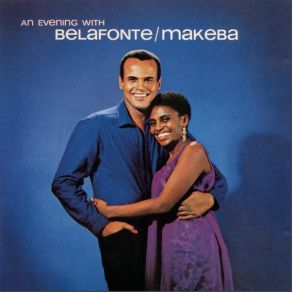An Evening With Belafonte/Makeba
Download links and information about An Evening With Belafonte/Makeba by Harry Belafonte, Miriam Makeba. This album was released in 1965 and it belongs to Jazz, World Music, Pop genres. It contains 12 tracks with total duration of 33:53 minutes.

|
|
|---|---|
| Artist: | Harry Belafonte, Miriam Makeba |
| Release date: | 1965 |
| Genre: | Jazz, World Music, Pop |
| Tracks: | 12 |
| Duration: | 33:53 |
| Buy it NOW at: | |
| Buy on iTunes $9.99 | |
| Buy on Amazon $9.99 | |
Tracks
[Edit]| No. | Title | Length |
|---|---|---|
| 1. | Train Song (Mbombela) | 3:11 |
| 2. | Kwazulu (In the Land of the Zulus) | 2:32 |
| 3. | Hush, Hush (Thula, Thula) | 3:05 |
| 4. | Nongqongqo (To Thos We Love) | 2:17 |
| 5. | Give Us Our Land (Mabayeke) | 2:25 |
| 6. | Beware, Verwoerd! (Ndodemnyama) | 2:04 |
| 7. | Gone Are My Children (Baile Banake) | 2:52 |
| 8. | Hurry, Mama, Hurry! (Khawuleza) | 3:26 |
| 9. | My Angel (Malaika) | 3:15 |
| 10. | Cannon (Mbayi, Mbayi) | 2:48 |
| 11. | Lullaby (Thula Sthandwa Same) | 2:46 |
| 12. | Show Me the Way, My Brother (Iph'Indlela) | 3:12 |
Details
[Edit]Since Harry Belafonte and Miriam Makeba had appeared together in concert frequently in the early '60s, customers spying an LP called Evening With Belafonte/Makeba might reasonably have assumed that the record would contain a joint live performance by the two, and that might help explain why this album charted in the Top 100 despite its challenging material. To begin with, it is not a live album, but rather a studio recording. And it isn't so much a duo album, for the most part, as a joint album; Belafonte and Makeba perform together on only two tracks, "Train Song" and "Cannon." Otherwise, they split up the selections, each appearing on five. The real point of this album is to present a group of South African songs in more or less authentic fashion. They are sung mostly in either Xhosa or Zulu, with one song in Sotho and another in Swahili. Despite the English song titles (with the original titles following in parenthesis), there is only one moment on the album when the English language is spoken; that is when Makeba explains the meaning of "Khawuleza" (the Xhosa title of "Hurry, Mama, Hurry!") as referring to situations in which children alert their mothers that the authorities are coming. Both Belafonte and Makeba are frequently accompanied by a choir for some wonderful effects. This is a powerful album of traditional South African music, and anyone buying it realizing that will be well satisfied. Just don't think the disc is what it appears to be from the title.